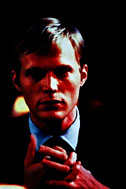
Movie Guru Rating:

Comment
on this review
| |

Gangster No. 1's London thugs don't break the mold
by Tamar Wilner
The British just can't get enough gangster movies. Or maybe, we just can't get enough British gangster movies. After all, Britcrime is a genre whose time has come. While we still endure innumerable Merchant-Ivory pictures about crusty, upperclass Englishmen of the 19th century, those weighty films are buoyed by a burgeoning genre focusing on the queen's less admirable subjects. Sure, there have been British gangster films as far back as the '60s, but recently they've proliferated with astonishing speed. Guy Ritchie's Lock Stock and Two Smoking Barrels (1998), especially, made a big splash on both sides of the pond and set the stage for imitators.
Add to the crowded field Gangster No. 1, which premiered in the UK in 2000 but only recently washed onto Yankee shores. Director Paul McGuigan and writer Johnny Ferguson don't stray from the Britcrime formula; their gangsters act and talk largely as we'd expect them to. What McGuigan and Ferguson try to add to the recipe is a Shakespearean tale of ambition, jealousy, and betrayal. Unfortunately, the filmmakers don't blend the Macbeth gimmick into the mix, but seem content to superimpose it on a bland bouillabaisse of gangster dialogue.
Paul Bettany portrays a young, nameless hoodlum enthralled with the material trappings of power; Malcolm McDowell plays the same, aged 30 years. When called to the swanky, leather-sofa'd pad of Freddie "The Butcher of Mayfair" Mays (David Thewlis), our twenty-something antihero is all too happy to join the Butcher's clan. He loves the rush of violence, whether beating rival gangsters with golf clubs or dropping jacked-up cars on debtors' heads. But most of all, he drools over Mays' style—his well-tailored suits, Italian shoes, ruby cufflinks, and perfectly groomed hair. Once under Freddie's wing, Young Gangster (as Bettany is credited) undertakes an odyssey for dominance, striving to destroy and supplant the very man he venerates.
Here's where Gangster No. 1 is at its best, exploring the thin boundary between adulation and jealousy. Young Gangster loves Freddie so much he hates him, and due to Bettany's strong performance, we don't see that as a contradiction. As the camera and Bettany's eyes linger over Thewlis' impeccably clad arm and gilded wrist, the audience may well wonder whether Young Gangster's feelings don't wander into lust, as well. Thewlis seems cast to encourage such speculation—his face carries an effeminate beauty intriguingly discordant with his profession. A larger exploration of this conflict could have produced a meaningful movie.
The filmmakers don't take that road. They don't even fully develop the plot of ambition. Sure, we're privy to Young Gangster's cynical machinations. But we also spend as much time in a sort of henchmen's boardroom, as the cabal talks strategy and its members trade obscenity-laced banter. The criminals speak unsurprisingly, crossing a Godfather swagger with Lock Stock and Two Smoking Barrels' Cockney swears, while somehow staying true to every gangster film that came between.
McGuigan's approach to violence is likewise derivative. His lens-splattering torture scene set to a perky '60s pop song pays its homage to A Clockwork Orange and Reservoir Dogs, yet does little to advance the plot or our understanding of the central character. Why is Young Gangster committing these acts? Is he just plain evil? The filmmakers think so, and they signify the character's black soul with frequent shots of Bettany glowering from beneath lowered brows (just like McDowell did in Clockwork 31 years ago). This is character development?
As the narrator, McDowell provides still more uninspired fare, both in content and delivery. Knowing what he'll say next is as easy as knowing a pop singer's going to rhyme "life" with "wife." "Lennie Taylor," McDowell will snarl, and you can mouth along as he wraps up his introduction, "Lennie Fucking Taylor."
What McDowell doesn't say is anything that effectively bridges past and future. We spend roughly two thirds of the movie watching Bettany glower much and speak little. Fast forward 30 years, and now we're cowering from spittle as McDowell's Gangster 55 spews invective, flashes cruel, crooked smiles and generally makes himself an eviler version of Jack Nicholson. (Yes, it is possible). They're both good performances, but they're of completely distinct individuals.
These are the elements of a scrapbook, not a movie. Pasting together dialogue from here, a beating scene from there, McGuigan and Ferguson have crafted a love letter to Tarantino, Ritchie, Kubrick, and McDowell. But as an audience, all we come away with is a bloody mess.
EDITOR'S NOTE: Gangster No. 1 is only playing through Thursday, August. 29.

August 29, 2002 * Vol. 12, No. 35
© 2000 Metro Pulse
|





